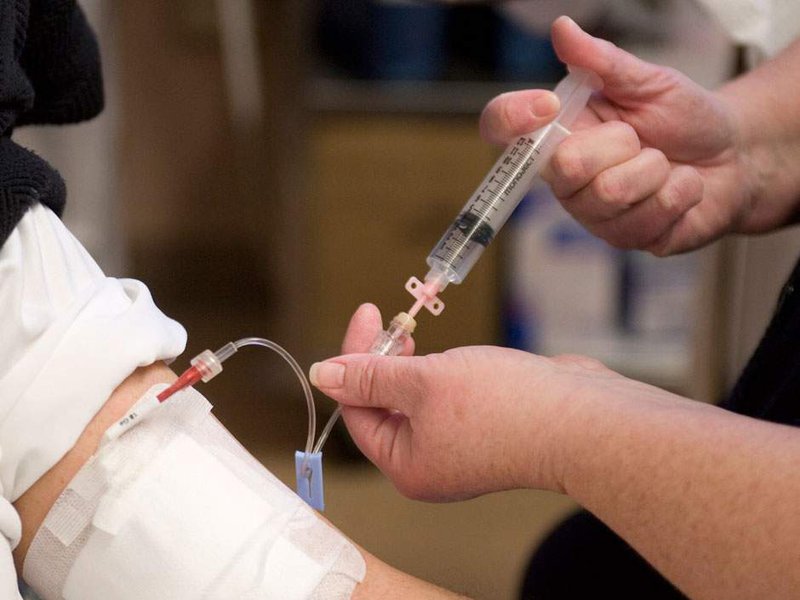The article was written by doctors from the Department of Oncology – Radiation Oncology Center, Share99 Times City Health Hub.
New research based on previous research suggests that life time is significantly improved with peritoneal chemotherapy versus full-body chemotherapy therapy.
1. Research purposes comparing peritoneal chemotherapy (IP) and general chemotherapy (IV)
A phase III GOG–252 clinical trial by Dr. Walker and his associates (of the University of Oklahoma Center for Medical Sciences) was published in the Journal of Clinical Oncology and reported at the 2919 ASCO Conference in Chicago, USA. The study compared two peritoneal chemotherapy (IP) and general chemotherapy (IV) for ovarian meacular cancer. The results showed no difference in non-progressive extra life time (PFS) between the groups. Regimens with carboplatin IV and IP are better tolerated than cisplatin (2 drugs are in the same platinum group)
Purpose: Assess the impact of two chemotherapy regimens in the peritoneal (IP) versus general chemotherapy (IV) to see if there are differences for non-progressive additional living (PFS) in women with newly diagnosed ovarian myaltic cancer.

2. Research methods
From July 2009 to November 2011, patients undergoing radical surgery, are eligible for randomization into one of the following 3 branches for additional treatment of 6 additional cycles of chemotherapy:
- Branch 1 : IV paclitaxel 80 mg / m2 per week together with intravenous carboplatin (AUC 6 )/ 3-week cycle
- Branch 2 : IV paclitaxel 80 mg / m2 per week with carboplatin IP region (AUC 6 ) 3-week cycle
- Branch 3: IV paclitaxel 135 mg / m2 day 1, IP cisplatin 75 mg / m2 day 2 and IP paclitaxel 60 mg / m2 day 8 / cycle 3 weeks
All research group patients are treated along with bevacizumab 15mg/kg IV every 3 weeks/from cycle 2 to cycle 22.
3. Research results
A total of 1,560 participants and a follow-up period of 84.8 months . The average non-progressive disease (PFS) survival period is 24.9 months in the carboplatin IV ceding, 27.4 months in the carboplatin IP branch, and 26.2 months in the CISplatin IP branch. Subgroup analysis of 1,380 stage II/III patients with minor lesions < 1cm ( sau phẫu thuật ), có PFS trung vị lần lượt là 26,9 (IV-carboplatin), 28,7 (IP-carboplatin) và 27,8 tháng (IP cisplatin) và thời gian sống thêm toàn bộ ( OS) trung vị cho những bệnh nhân này lần lượt là 35,9, 38,8 và 35,5 tháng.
For the group that is completely free of post-radicalization surgery, the total life time (OS) for the first 2 branches is 98.8 months, 104.8 months, and the 3rd branch alone does not have a figure.
The total additional life time (OS) for all studies for 3 branches was 75.5, 78.9 and 72.9 months, for each.
About the side effects :
3rd degree toxicity is more common in the CISplatin IP group (17.7%) and carboplatin IP group (17.2%) compared to carboplatin IV group (11.5%; P = 0.008). Nausea and vomiting level 3 are more common (P <0,005) trong nhóm IP cisplatin so với nhóm carboplatin IV và IP carboplatin (11,0% so với 5,1% và 4,7%). More common 3rd degree hypertension (P <0,005) trong nhóm IP cisplatin so với nhóm carboplatin IV và IP carboplatin (20,5% so với 11,9% và 14,3%).
4. Conclusions of the study

Compared to the carboplatin IV reference branch, disease-free additional life time (PFS) does not increase significantly compared to IP mode when combined with bevacizumab. Carboplatin-tolerant patient branch is better tolerated than topicular cisplatin branch (IP)
While the benefits of pericarditis are not evident in this large randomized clinical trial, according to the IP therapy researcher may still benefit in some patients.
In an article on Oncology, Dr. Sara Bouberhan of Beth Israel Deaconess Medical Center in Boston suggested that taking bevacizumab supplements or changing the specifics of the drug schedule may explain ina ineffectiveness with IP therapy. The doctor noted that there are ongoing trials that can bring more clarity about the effectiveness of treatments .
Studies like this show that new strategies are needed to further improve the treatment of advanced ovarian cancer. The study to find new anti-cancer drugs such as PARP inhibitors and immunosuppressives will be an important next step in improving the outcome of patients who unfortunately suffer from the disease.
Currently, two treatments for ovarian cancer with peritoneal chemotherapy (IP) and general body chemotherapy (IV) are applied at Share99 Times City International Health Hub.
For direct advice, please click hotline number or register online HERE. In addition, you can register for remote consultation HERE
Source : ASCO post 2019
- Ovarian cancer: Causes, signs of recognition, stages of development
- Ovarian cancer: Susceptible subjects, symptoms and classification
- Follow-up after ovarian cancer treatment

